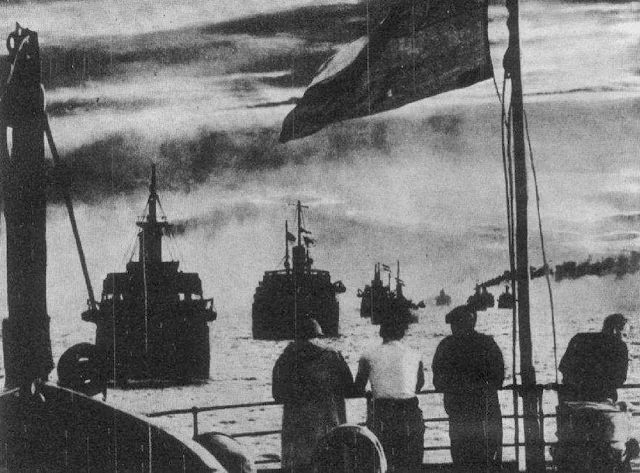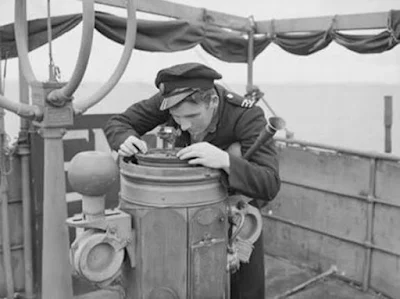 |
|
Allied convoy crossing the North Atlantic in 1942. |
With Britain in the 1930s heavily reliant on food imports, the Merchant Navy formed a vital lifeline, keeping the country running
After the First World War King George V, in recognition of the contribution made to the British war effort by merchant ships, granted the title of ‘Merchant Navy’ to non-military sailors. As the outbreak of World War II edged closer in 1939, the British merchant fleet remained the largest in the world, employing some 200,000 men and women. This number made up around one third of the entire global merchant fleet at the time, with many of the seamen coming from all over the Empire, including India, Hong Kong and West Africa.
As the outbreak of World War II edged closer in 1939, the British merchant fleet remained the largest in the world, employing some 200,000 men and women.
After the declaration of war in September 1939, the Ministry of Shipping – then under the control of Lieutenant-Colonel Sir John Gilmour – took control of the merchant fleet. It was the job of the Ministry to decide what cargo the ships would carry and the function they would fulfill in order to best support the war effort, while crewing and provisioning remained under the jurisdiction of the shipping industry.
Particular emphasis was put on implementing the convoy system, by which warships would customarily escort groups of merchant ships to deter attacks from German U-boats. With all of Britain’s oil arriving by sea, half of her food, and most of her raw materials – more than a million tonnes per week, in total – the smooth functioning of the merchant fleet was integral to the nation’s survival.
The struggle for control over the Atlantic shipping routes, which would eventually become known as the ‘Battle of the Atlantic,’ was one of the longest campaigns of WWII. Germany turned submarines, battleships, aircraft and mines on Britain’s supply lines, while British and American shipyards worked tirelessly to replace those ships that were sunk.
Despite sharing the word ‘Navy’ in their titles, the difference between the Royal and Merchant Navies was that sailors in the latter were classed as civilians. After the outbreak of war, Germany declared that every vessel of the British mercantile marine was to be regarded as a warship, meaning that the sailors of the Merchant Navy faced tremendous risks. Tragically, 30,248 merchant seamen lost their lives during World War II, a death rate proportionally higher than in any of the armed forces.
 |
|
Allied convoy. |
 |
|
A sailor at the wheel of one of the merchant ships during an enemy attack on a Malta bound convoy that got through. |
 |
|
The mate of the tanker MV Empire Unity John Waters, who is responsible to the captain for the working of the ship, taking a compass reading whilst the ship was in convoy. |
 |
|
The boatswain and his mate splicing ropes on board the merchantman MV Empire Unity whilst she was in convoy. Imperial War Museum A 11804. |
 |
|
The second officer of MV Empire Unity "shooting the sun" or taking a sun sight with the sextant whilst she was in convoy. |
 |
|
Men sponging out the gun after firing on the merchant ship MV Empire Unity whilst she was in convoy. Imperial War Museum A 11820. |
 |
|
On board the merchant ship Cape Hawke her skipper Captain D N Taylor checks the course and speed with the man at the wheel. |
 |
|
An impromptu sing song in the dog watches on board the merchant ship MV Empire Unity. One man is playing an accordion whilst another plays what appears to be a mandolin. |
 |
|
Group photo, officers of SS City of Manila, a cargo steamer of the Ellerman City Line, sunk in the Atlantic by a German torpedo in 1942, with just one crew member lost. |
 |
|
British Merchant Navy blazer badge. |
 |
|
British Merchant Navy On War Service silver lapel badge. |
 |
|
British Merchant Navy lapel pin badge. |
 |
|
British Merchant Navy badge. |
 |
|
Badge of the British Merchant Navy as inscribed on the grave of late A.V. Frain of SS St. Vincent de Paul, at Stanley Military Cemetery, Hong Kong. |
 |
|
"Heroes All" - men of the Merchant Navies .. British and Allied. |
 |
|
"The life-line is firm thanks to the Merchant Navy." |
 |
|
Second World War poster highlighting wartime dangers that the Merchant Navy faced. The National Archives (United Kingdom) INF3/127. |
 |
|
Britain's Sea Power is Yours! |
 |
|
On the Atlantic Front. |
 |
|
Britain's Sea Power is Yours! |
 |
|
Give thanks to the everyday heroes of Britain's Merchant Navy. |
 |
|
To the Merchant Navy — Thank You! |
 |
|
To the Merchant Navy — Thank You! |
 |
|
Great Britain postage stamp sheet honoring the Atlantic and Arctic Convoys. |
 |
|
British Merchant Navy Memorial, Pier Head, Liverpool. |


No comments:
Post a Comment